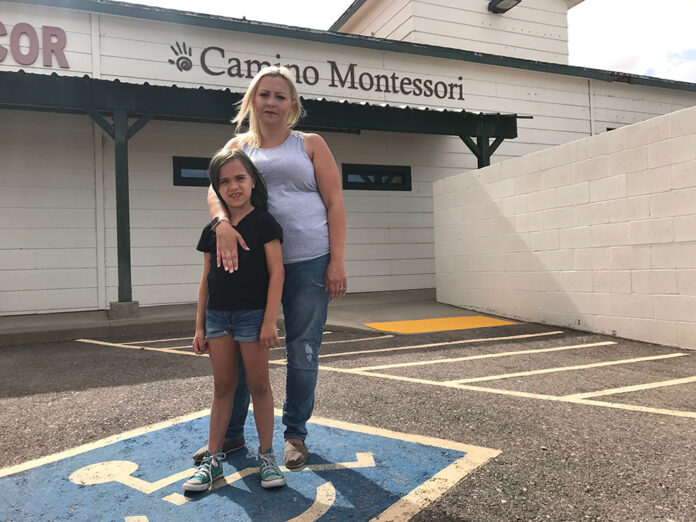
[quote_box_right]Next, InMaricopa looks into how the school’s remaining assets, including a three-acre parcel of land currently listed for sale at $700,000, will be disposed of and explore similar problems with charter schools throughout the state. [/quote_box_right]As Camino Montessori officials and board members continue to avoid questions about the school’s closure on Oct. 5, one thing has become clear: the possibility of closure was kept from parents and employees from a week to several months.
Camino Montessori Director Judy Webster writes an open letter to the community
School officials also appear to have been less than forthcoming about its financial situation. According to the school’s annual filing with the IRS as a nonprofit, known as a 990, when its expenses were subtracted from its revenue the school showed negative $87,957 for 2015 and negative $22,474 for 2016.
The Arizona State Board for Charter Schools (AZBCS) was informed that a closure vote was imminent on Sept. 27, according to statements from AZBCS Quality Assurance and Accountability Manager Rachel Hannah.
Plans to transfer control of the school to The Charter Management Group (TCMG) apparently fell through sometime in August. The company is run by partners Doug Pike and Bil Zeleny, who currently operate three charter schools in Arizona, according to its website. Fountain Hills Charter School, one of those operated by TCMG, recently received an F grade, the lowest possible, in its most recent assessment by the AZBCS. Their other schools received D and B ratings.
At a school board meeting on June 29, a motion to accept the resignation of Judy Webster as CEO and board president passed with three yes votes and three abstentions. Motions appointing Pike as president and CEO and Zeleny as corporate secretary and treasurer also passed, though they were not implemented. Other votes saw Pike prepared to replace Webster as the school’s authorized representative with the AZBCS.
TCMG pulled out of the deal sometime in August, possibly at the school’s board meeting that month. Notes from that meeting have yet to be made public. However, when interviewed, Pike said, “I think that you can surmise that our interest was not in something that was significantly underwater.”
DJ White, a former teacher for the school who was hired in 2017 and terminated in January of 2018, claimed to have been aware of financial difficulties from “within the first four hours I was there.
“The school was starting year five and had many signs of a struggling school, in my opinion,” White said via email. “[There were] no playground structures or fenced area for kids to play, technology that was antiquated or did not work, no health insurance for employees beyond Aflac, which is supposed to be supplemental insurance.”
White claimed to have regularly spent $200 a month on school supplies, that few if any classes were at capacity and that Webster did little to no fundraising.
“All of these were red flags,” White said.
He also said the turnover rate for teachers was unusually high and the performance of students on assessment tests was poor. According to information from the Arizona Department of Education, the results for combined fall 2017 and spring 2018 state assessment tests showed only 3 percent of the school’s tested students passed in math and 38 percent for English.
White claimed Webster delayed or failed to provide evaluations or services for students with disabilities so they could obtain individualized education programs, known as IEPs, which are written plans for accommodating disabled students. He said, “the school took a huge hit financially because of having to settle a lawsuit for failure to provide services as required by law.”
Ada Marie Plaza Nieves, who taught at the school and whose son attended it, alleges Webster denied her son an evaluation for an IEP on multiple occasions. She corroborated White’s account.
“I also know the family that ended up suing the school for not providing services to their autistic child,” Plaza Nieves said in a Facebook messenger communication.
According to the most recent documents, Camino Montessori had 66 students enrolled. Parent Michelle Bowman, who called the workings at the school “fishy,” said she was able to enroll her daughter Abigail in Sequoia Pathway after the sudden closure.
Joshua Babb, another parent of a student at the school, was preparing to join the board and was surprised by its closure.
“Through the period of time leading up to the closure, Judy Webster gave no indication to myself – as someone applying for the board – that they were in any danger of closing,” Babb said.
He was not surprised by the board’s reluctance to comment.
“Most of the board are close friends of the Websters,” Babb said.
White also cited Webster’s personal ties to the school’s board as a conflict of interest.
“Judy was taking a salary of over $61,000 and did almost zero fundraising,” White said. “Any board not stacked with friends and family would have canned her for that alone, years ago.”
Webster declined to comment for the story, citing the advice of an unnamed attorney. The members of the school’s board also declined to answer questions about the cause and timing of the closure, citing non-disclosure agreements.


![Alleged car thief released without charges Phoenix police stop a stolen vehicle on April 20, 2024. [Facebook]](https://www.inmaricopa.com/wp-content/uploads/2024/04/IMG_5040-218x150.jpg)
![Locals find zen with Earth Day drum circle Lizz Fiedorczyk instructs a drum circle at Maricopa Community Center April 22, 2024. [Brian Petersheim Jr.]](https://www.inmaricopa.com/wp-content/uploads/2024/04/PJ_3922-Enhanced-NR-218x150.jpg)










![Alleged car thief released without charges Phoenix police stop a stolen vehicle on April 20, 2024. [Facebook]](https://www.inmaricopa.com/wp-content/uploads/2024/04/IMG_5040-100x70.jpg)
![Locals find zen with Earth Day drum circle Lizz Fiedorczyk instructs a drum circle at Maricopa Community Center April 22, 2024. [Brian Petersheim Jr.]](https://www.inmaricopa.com/wp-content/uploads/2024/04/PJ_3922-Enhanced-NR-100x70.jpg)
